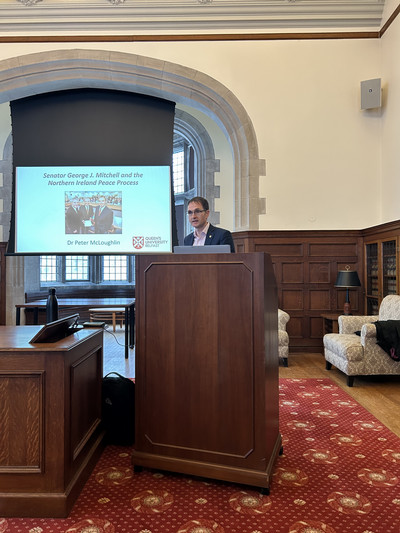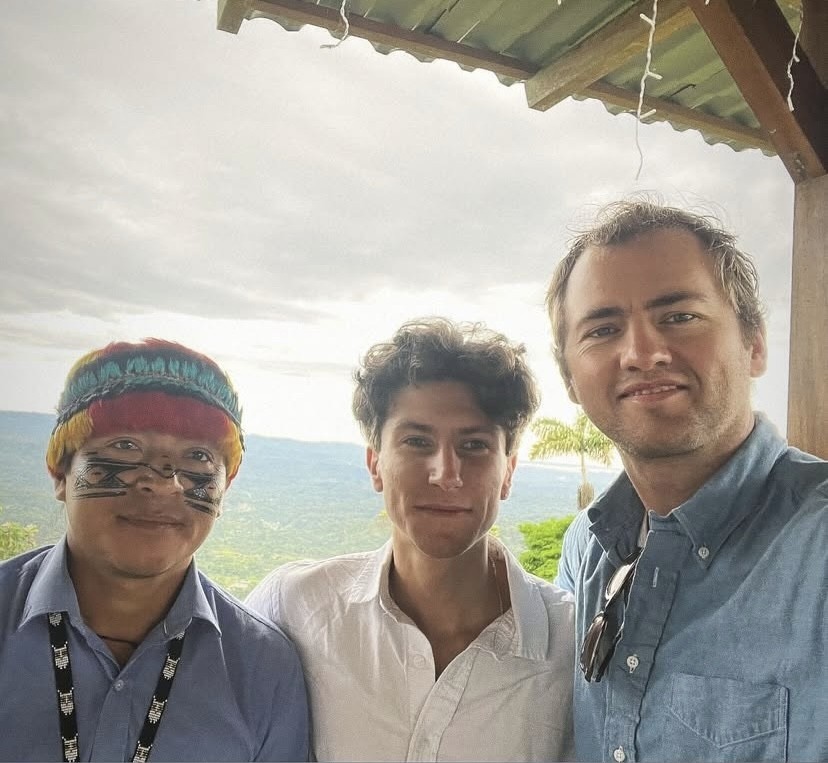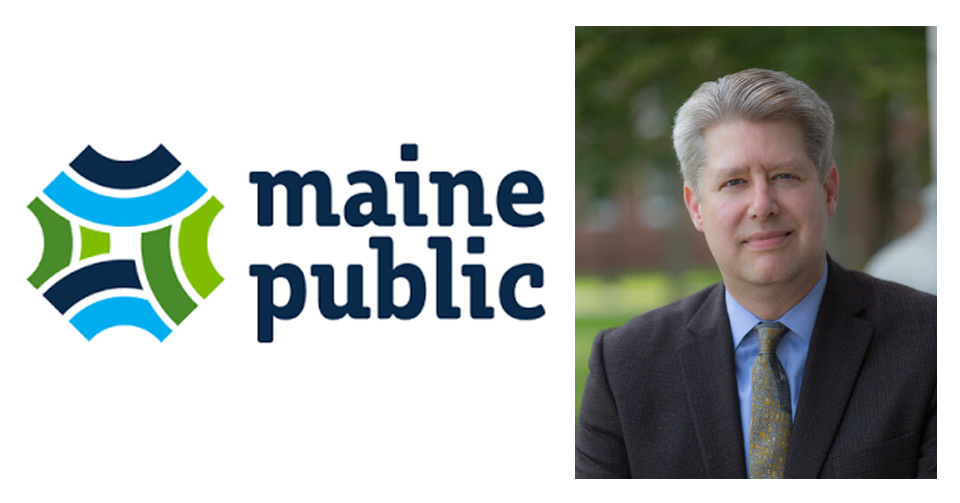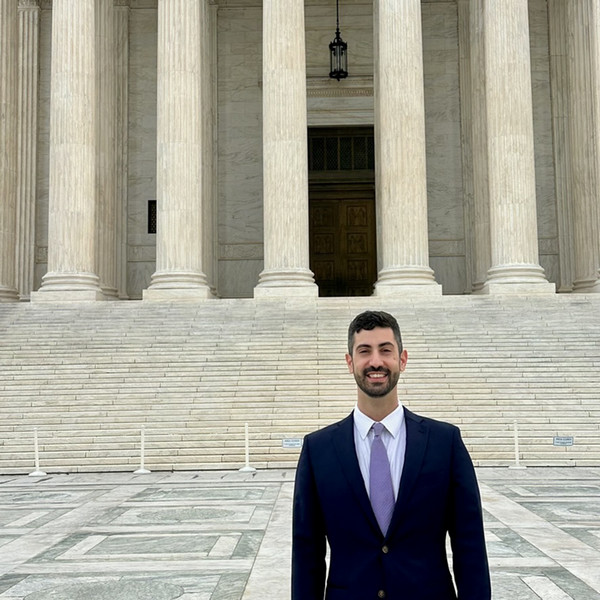Angus King: ‘Living the American Creed’
Angus King, a distinguished lecturer at the College since 2004, is a regular contributor to the Bowdoin Daily Sun. In his latest post, the former two-term governor of Maine warns against irrational fear and those who exploit it.
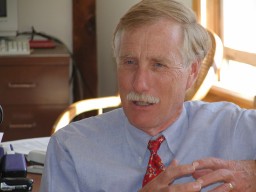
I have a vivid memory of a fishing trip with my dad and some of his buddies in southeastern Virginia when I was about 16, which would have made it somewhere around 1960. We were staying at a cabin on the north bank of Piscataway Creek and were after shad and the occasional bass. One night after dinner, the men got to talking about this and that, and soon the conversation turned to the hottest topic in Virginia in those days: racial segregation.
The de facto (and often de jure) separation of the races, which had been the universal arrangement in the south for a hundred years, was just starting to crumble, and most of Dad’s friends didn’t like it. My father was a quiet man, not much given to argument, and he kept his views to himself as the tenor of the talk turned more and more negative. Finally, one of his friends slammed the table and blurted out, “I didn’t fight that war (WWI in his case) so nigras (the word often used by the more genteel southern whites—almost literally half way between “negro” and the more unpleasant “n-word”) could go to our schools and eat in our restaurants!”
This was too much for Dad. He slammed his own hand on the table and I can hear his voice as if it were yesterday: “Damn it, Paige, you don’t have the slightest idea why you fought that war.” In that simple exchange was captured one of the enduring paradoxes of American life—that we have a clear and specific creed in this country: “all men are created equal,” “liberty and justice for all,” “and crown thy good with brotherhood,” “secure the blessings of liberty,” “Congress shall make no law respecting an establishment of religion, or prohibiting the free exercise thereof,” “sweet land of liberty,” “let freedom ring,” and on and on. But an awful lot of people either don’t believe it or think there are hidden asterisks that qualify the promise of the creed when it comes to some other people they don’t like.
For the first 70 years of our national existence, of course, the most glaring exception was the slaves—brought here against their will and subjected to indignities and deprivation few of us can imagine. It took a bloody and hugely destructive war to adjust that reality to at least some semblance of concurrence with the creed, and we’re still working on that to this day.
The other group to whom the creed didn’t fully apply when it was first enunciated was the half of the population that was female. Most of my students are surprised to learn that women didn’t have the right to vote—one of the most basic guarantees of the creed (remember “taxation without representation?”)—until 1920, and that that bit of progress took some 50 years of struggle and came down to one lone vote in the Tennessee legislature to make it a reality.
Underlying this more or less permanent resistance to the full realization of the promise of the American creed is what appears to be the natural human tendency to hate—or at least fear—people who are somehow different, whether by reason of race, creed, national origin, or any other perceived dissimilarity. I suspect it’s a genetic predisposition going back to the days when people from the next valley really were to be feared, and therefore hated. In short, we seem to need enemies, be they foreign or domestic. Sometimes, the fear is not irrational (even paranoids occasionally have real enemies); but often the fear is fanned and exaggerated until it becomes generalized to everyone in the suspect group, even if most of them are just ordinary folks like the rest of us.
The fanning and exaggerating is usually done by politicians who are exploiting this unfortunate human tendency to gain political power and maintain economic advantage, often at the expense of the very people they are stirring up. In the south, where I grew up, this was a high art; keep the poor whites focused on the black threat, and they won’t notice that the tax code, rules about unions, and other economic arrangements are screwing them.
In the rest of the country during this period, this role was filled admirably by the communists—monolithic, godless, foreign, and bent upon our destruction. Of course, a whole generation of politicians made their careers by exploiting the fear of these “others,” be they black or red. Bilbo, Wallace, Thurmond, Faubus, Maddox, McCarthy, and Nixon all spring to mind, with the latter forging a melding of the two in the famous “Southern Strategy,” the remnants of which today threaten the viability of the Republican Party.
All of which brings us to the summer of 2010 and a radio ad I heard the other day on behalf of a fellow running for Congress in New Hampshire. It was all about illegal immigration and his stalwart support for the Arizona “show me your papers” law. Now, maybe an argument can be made about the need for such a law in Arizona (I’m pretty skeptical), but in New Hampshire? Are those dreaded Canadians darting across into Dixfield Notch and providing free health care or just being annoyingly polite to everyone they meet? I mean, New Hampshire?!
Or is this guy simply seeking to exploit “The Fear” and literally scare up some votes? After all, the illegal immigrants everyone is concerned with hit the “race, creed, or national origin” trifecta, with a foreign language thrown in. I think the answer is pretty obvious.
Finally, there are the Muslims, who are rapidly becoming the communists of our age—monolithic (actually, they’re far from it—ask a Shia about a Sunni), godless (well, not exactly, but He’s not our God), foreign (well, not exactly, since there are some 10 million Muslims right here in the U.S.A.) and bent upon our destruction (or at least some of them are). It is undeniable that there are Muslims who are jihadists, and whether the percentage is 1% or 15% (Google provides a wide range of estimates), this represents a big number, since the Muslim population in the world now totals over 1.5 billion (1% of 1.5 billion is a not inconsiderable 15 million destructive souls). But it’s also true that the vast majority (reciprocally, somewhere between 85% and 99%) are neither radical nor ill-disposed to the West.
This past year, for example, we had a foreign exchange student living with us who was a Muslim from Ghana. She vaguely knew about 9/11 but had never heard of al-Qaeda or Osama Bin Laden and was genuinely puzzled as to why a young Muslim would want to do such a thing. She read the Koran and prayed five times each day and was one of the most peaceful souls I’ve ever met. And she absolutely loves America and dearly hopes to return here someday. Why would anyone want to insult and thereby push her toward radicalization?
And yet, that is precisely what this summer of more and more strident Muslim-bashing is accomplishing. Ironically, it also makes any semblance of achieving our goals in Iraq and Afghanistan just about impossible.
In fact, we are presented with a delicate and crucial question: how to defend ourselves against the real jihadists without inadvertently replenishing—or increasing—their numbers in the process. At a minimum, it seems to me, this requires that we be careful not to lump all Muslims (Osama and our exchange student) into one undifferentiated mass defined as “The Enemy.” Secondly, we must try to find ways to encourage and support voices of moderation within the Muslim community (and it now appears that the guy behind the “Ground Zero Mosque” is such a voice). We should also refrain from acts and rhetoric that can easily be turned into recruiting posters for al-Qaeda and its ilk—like the brilliant plan announced by a Florida church to burn a Koran on September 11 (way to make Bin Laden’s day). At least they backed off, but it was a near thing.
And my personal favorite, never vote for someone who seeks to divide and exploit us by demonizing others.
In the end, it seems to me, the best defense we have is to actually live the American creed, the most powerful political idea ever unleashed upon the world. It will drive our enemies crazy.
“The Washington Post recently had thoughtful and informative pieces on the subject of the jihadist threat by Fareed Zakaria and Ted Koppel. Both are worth reading.”
